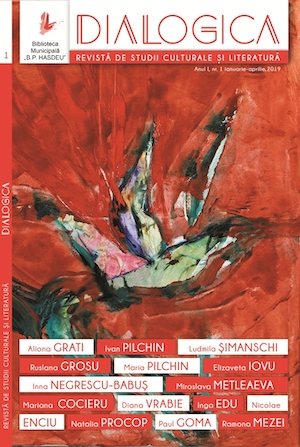DIALOGICA Revistă de studii culturale și literatură
DIALOGICA Cultural Studies and Literature Scientific Journa
Publishing House: ArtPoligraf SRL
Subject(s): History, Philosophy, Language studies, Language and Literature Studies, Literary Texts, Fine Arts / Performing Arts, Foreign languages learning, Essay|Book Review |Scientific Life, General Reference Works, Library and Information Science, Applied Linguistics, Studies of Literature, Comparative Study of Literature
Frequency: irregular and other
Print ISSN: 2587-3695
Online-ISSN: 1857-2537
Status: Active
- 2019
- 2020
- 2021
- 2022
- 2023
- 2024
- Issue No. 3/140
- Issue No. 1/II
- Issue No. 2/II
- Issue No. 3/II
- Issue No. 1/III
- Issue No. 2/III
- Issue No. 3/III
- Issue No. 1/IV
- Issue No. 2/IV
- Issue No. 3/IV
- Issue No. supplement/IV
- Issue No. 1/V
- Issue No. 2/V
- Issue No. 3/V
- Issue No. supplement/V
- Issue No. 1/VI
- Issue No. 2/VI
- Issue No. 3/VI
Articles list
{{ article.TitleOriginalLanguage }}
{{ article.TitleOriginalLanguage }}
({{ article.TitleEnglish }})
- Publication: {{ article.Publisher }} ({{ article.Issue }})
- Author(s): {{ article.Authors }}
- Contributor(s): {{ article.Contributors }}
- Language: {{ article.Language }}
- Subject(s): {{ article.Subjects }}
- Issue: {{ article.Issue }}
- Page Range: {{ article.PageRange }}
- No. of Pages: {{ article.NumberOfPages }}
- Keywords: {{ article.Keywords }}
- Summary/Abstract: {{ article.SummaryAbstract }}
- Price: {{ common.currency(article.Price) }}
Short Description
Dialogica is a scientific publication with Open Access. The founders of the journal are B. P. Hasdeu Municipal Library (Chisinau) and Department of Social, Economic, Humanities Sciences and Arts Section of the Academy of Sciences of Moldova. We, the researchers of a group set up in a new-old composition at B. P. Hasdeu Municipal Library Research Section, we propose a ramp of experimentation, one on whose surface our humanistic training to justify its efforts and to be used in the service of all readers, not just those in the academic space. We will adapt the academic practices (literary theory, comparative literature, history, philosophy, ethnology, anthropology, plastic arts, translation studies, and so on) in order to care for the general audience of the central library and, in fact, the entire society. By virtue of our location between the university and the institute of scientific research, the exercise of transgression of the boundaries of disciplinary specialization, but also of scientific journal conventions, in which we isolated ourselves not without a certain pride, being accessible only to a small circle of initiates in the hieroglyphs in a particular field, will not encounter obstacles in this publication. We want a breath of oxygen in a suffocating world of template, a release of vision and a new impetus for our concerns. We aspire to a typographical space in which dialogue as a means of communication, thinking and human knowledge connects us to the Western academic world. Science cannot exist in isolation, it is revealed and renewed only at the border with foreign ideas. We are committed to building a field of interaction, a mutually supportive relationship, a viable exchange of ideas. We are also proposing a meeting of goals and projects to facilitate symbolic communication with the other, opening up to the pluralism of the theoretical perspectives and orientations. Our dialogue will focus on the contemporary cultural phenomenon as a product of thought and creativity and will manifest itself in the field of socio-human and art sciences. Therefore, we see fit in the paradigm of interdisciplinary dialogue, of the relationships between approaches of different disciplines. Considering that most of us come back from literary studies (see the Archive of Metaliterature journal), the widening of the horizon towards cultural studies is a challenge that we undertake in this way. We will, therefore, facilitate articles with theoretical and interpretative concerns from the area of cultural studies, where literature, for example, is a cultural phenomenon like any other in the context of its time. However, in order to create a pendant in reducing the number of literary studies that generated self-transformation and loan of new and extremely prolific research methods, we reserved a special place in the title of the journal and in the space of some columns, for literature and its promotion.

